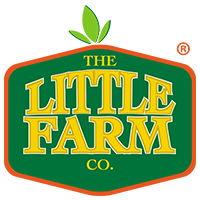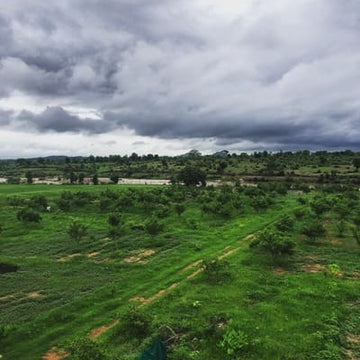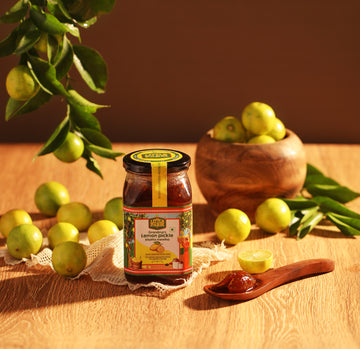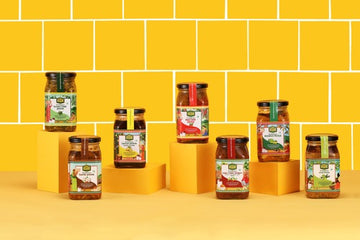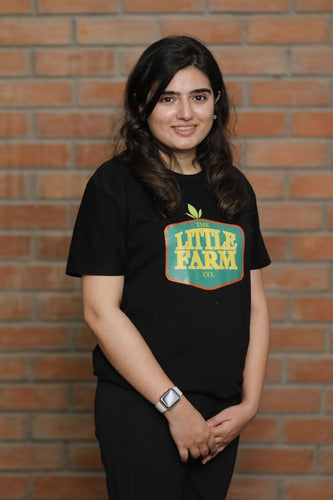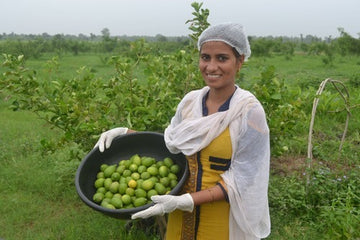Khajuraho is a UNESCO World Heritage Site in the Indian state of Madhya Pradesh that features exquisite temples erected during the Chandela reign. But did you know that, in addition to its rich cultural legacy, Khajuraho also houses our pickle farms?
We cultivate the freshest and most premium ingredients for our tasty pickles at our pickle farms. Everything from mangoes to lemons to mixed veggies is farmed with the utmost care and affection on the beautiful soil of Khajuraho.

I recently visited one of our fields and spoke with the head farmer, Mr. Ram Kumar, to have a better knowledge of our pickle-making process.
Can you tell us about the pickle-making tradition in Khajuraho?
श्री कुमार: खजुराहो में अचार बनाना सदियों पुराना रिवाज रहा है। हमारे पूर्वजों ने मौसमी फलों और सब्जियों का अचार बनाने की तकनीक में महारत हासिल की थी, और यह प्रथा पीढ़ी-दर-पीढ़ी चली आ रही है।
Mr. Kumar: Pickle-making has been a centuries-old custom in Khajuraho. Our forefathers mastered the technique of pickling seasonal fruits and vegetables, and the custom has been passed down from generation to generation.
What sets our pickles apart from others in the market?
श्री कुमार: हम हमेशा अपने खेतों में उगाए जाने वाले बेहतरीन और ताजा खाद्य पदार्थों का उपयोग करते हैं। हमारे सभी अचार हाथ से बनाए जाते हैं, जिनमें कोई कृत्रिम परिरक्षक या स्वाद नहीं होता है। हमारा रहस्य अद्वितीय मसाला संयोजन है जिसका हम उपयोग करते हैं, जो पीढ़ियों से चला आ रहा है और हमारे परिवार के अलावा किसी के साथ कभी भी चर्चा नहीं की गई है।
Mr. Kumar: We always utilise the finest and most fresh foods cultivated on our farms. All of our pickles are produced by hand, with no artificial preservatives or flavours. Our secret is the unique spice combination we utilise, which has been passed down through generations and has never been discussed with anybody other than our family.
Can you walk us through the pickle-making process on your farm?
श्री कुमार: बेशक, निःसंदेह! यह सब हमारे खेतों से सबसे बड़े फल को हाथ से चुनने से शुरू होता है। उसके बाद, सामग्री को साफ किया जाता है और आकार में काटा जाता है। इसके बाद मसालों को उचित अनुपात में मिलाया जाता है और अचार बनाने की प्रक्रिया शुरू हो जाती है।
अचार बनाने से 2-3 घंटे पहले फलों और सब्जियों को तोड़कर, हम यह सुनिश्चित करने की कोशिश करते हैं कि हम सबसे ताज़ी और पौष्टिक सामग्री का उपयोग कर रहे हैं।
अचार बनाने के लिए, हम बड़े मिट्टी के बर्तनों का उपयोग करते हैं जिन्हें तापमान और आर्द्रता की स्थिति के लिए सावधानीपूर्वक नियंत्रित किया जाता है। पैक करने और वितरित करने से पहले अचार को कई दिनों तक विकसित होने दिया जाता है।
Mr. Kumar: Of course, Without a doubt! It all begins with hand-selecting the greatest fruit from our farms. After that, the ingredients are cleaned and chopped to size. The spices are then combined in the appropriate proportions, and the pickling process begins.
By plucking the fruits and vegetables 2-3 Hours before pickling, we try to ensure that we are utilising the most fresh and nutritious ingredients.
For pickling, we utilise huge clay pots that are meticulously controlled for temperature and humidity conditions. The pickles are allowed to develop for many days before being packaged and distributed.
What measures do you take to ensure the quality of your pickles?
श्री कुमार: गुणवत्ता हमारे लिए अत्यंत महत्वपूर्ण है, और हम यह सुनिश्चित करने के लिए काफी हद तक जाते हैं कि हमारे अचार सर्वोत्तम गुणवत्ता वाले हैं। वास्तव में हमारे सभी व्यंजन मानकीकृत हैं और हम FSSAI द्वारा निर्धारित सभी सुरक्षा नियमों का पालन करते हैं। पारंपरिक तरीकों का पालन करने के लिए सबसे बड़ी सामग्री का उपयोग करने से, हम आपकी तालिका में सर्वश्रेष्ठ लाने में कोई कसर नहीं छोड़ते हैं।
Mr. Kumar: Quality is extremely important to us, and we go to great lengths to guarantee that our pickles are of the best quality. In fact all our recipes are standardised and we follow all safety regulations laid down by the FSSAI. We leave no stone left in bringing the best to your table, from utilising the greatest ingredients to following traditional ways.
Can you tell us a little bit about the different varieties of pickles you make on the farm?
श्री कुमार: हम क्लासिक आम के अचार से लेकर अधिक विदेशी नींबू और मिश्रित सब्जियों के अचार तक कई तरह के अचार बनाते हैं। हम गोभी गज्जर शालगम अचार भी बनाते हैं जो हमारे ग्राहकों के बीच बहुत लोकप्रिय है। और जो लोग इसे ज्यादा तीखा पसंद करते हैं, उनके लिए हमारे पास हरी मिर्च का अचार है जो काफी पंच पैक करता है। हम आम के सौंफ के अचार की तरह एक अलग ट्विस्ट के साथ जाने-पहचाने स्वाद को लाने की कोशिश करते हैं।
Mr. Ramesh: We make a wide range of pickles, from the classic mango pickle to the more exotic lemon and mixed vegetable pickles. We also make a Gobhi Gajjar Shalgum pickle that's very popular among our customers. And for those who like it extra hot, we have the green chili pickles that pack quite a punch. We try to bring the known flavours with a different twist like the Mango Saunf Pickle.
That's fantastic! Could you tell us more about how you cultivate the produce using traditional methods?
श्री कुमार: बिल्कुल। हम मानते हैं कि "सबसे बड़ा फल सर्वोत्तम प्रक्रियाओं से आता है,"। इसलिए हम अपने खेतों में कृत्रिम खाद के स्थान पर प्राकृतिक खाद जैसे गोबर और खाद का प्रयोग करते हैं। हमारी फसलों की खेती जहरीले कीटनाशकों के उपयोग के बिना की जाती है, यह गारंटी देते हुए कि भोजन न केवल आपके लिए अच्छा है, बल्कि पर्यावरण के लिए भी अच्छा है।
Mr. Ramesh: Absolutely. We believe that "The greatest fruit comes from the best procedures,". That is why we use natural fertilisers such as cow dung and compost instead of artificial fertilisers in our farms. Our crops are cultivated without the use of toxic pesticides, guaranteeing that the food is not only good for you, but also good for the environment.
That is admirable. So, how does this time-honored method improve the flavour of your pickles?
श्री कुमार: धन्यवाद। पारंपरिक कृषि पद्धतियाँ ऐसा भोजन बनाती हैं जो स्वास्थ्यवर्धक और अधिक स्वादिष्ट दोनों होता है। इन तरीकों से उगाए जाने वाले फलों और सब्जियों में एक प्राकृतिक मिठास और खट्टापन होता है जो मौजूदा तरीकों में नहीं होता है। बदले में, यह हमारे अचार के स्वाद में सुधार करता है, जिससे वे वास्तव में अद्वितीय बन जाते हैं। हमारे पास एक नदी भी है और हम उस पानी का उपयोग अपने खेतों में खेती के लिए करते हैं।
Mr. Ramesh: Thank you. Traditional agricultural practices create food that is both healthier and tastier. Fruits and vegetables cultivated utilising these ways have a natural sweetness and tanginess that current methods do not have. This, in turn, improves the flavour of our pickles, making them genuinely unique. We also have a river nearby and we use that water for the cultivation in our farms.
It's incredible to see how much care, time and attention goes into each jar of pickles.
Mr. Ramesh, thank you for allowing us a peek inside the intriguing world of pickle-making at our Khajuraho farms.
What else is famous in Khajuraho that one must do if they visit here?
List of 5 top things to do in Khajuraho:
- Explore the temples: Khajuraho is famous for its temples, including the Kandariya Mahadev Temple, Lakshmana Temple, and Chausath Yogini Temple. These temples are renowned for their intricate carvings and stunning architecture.
- Take photos of the temples: Khajuraho's temples are a photographer's delight. With their intricate carvings and beautiful architecture, they make for stunning photos.
- Go cycling in the city: Rent a bicycle and explore the city on your own. This is a great way to see the local life and experience the town at your own pace.
- Take a village tour: Take a guided tour of the nearby villages to get a glimpse of the rural life and the local culture.
- Visit Raneh Falls: Located about 20 km from Khajuraho, Raneh Falls is a beautiful waterfall that cascades over a series of rocks and offers breathtaking views of the surrounding countryside.
Finally, our pickle farms in Khajuraho are a proud reminder of the region's rich legacy and tradition of pickle-making. To witness it yourself, you can take a tour at our Khajuraho farm. Get in touch with us if you would like to visit our farm.

Our farmers' enthusiasm and devotion ensure that every jar of pickle that arrives at your table is brimming with flavour, quality, and affection.
So the next time you enjoy one of our delicious pickles, remember the rich history and heritage behind it.
